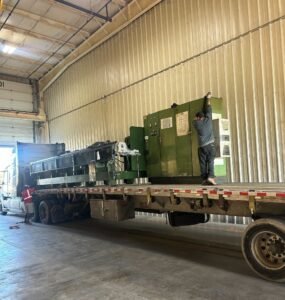In today’s fast-paced industrial environment, space is often at a premium. As companies grow and expand, the need for additional storage becomes not just a convenience but a necessity. However, expanding on-site storage can be costly, both in terms of financial investment and operational complexity. That’s where industrial storage outsourcing comes into play. By partnering with a reliable third-party storage provider, businesses can free up space, reduce costs, and streamline their operations.
This article delves into the benefits of industrial storage outsourcing and explores how it can simplify your business operations. We’ll cover key sections such as the advantages of outsourcing, how to choose the right storage partner, and the types of industries that benefit most from outsourced storage solutions.
The Benefits of Outsourcing Industrial Storage
When industrial companies think about storage, they often consider building additional warehouses or purchasing land to store excess materials, inventory, or machinery. However, outsourcing storage offers a myriad of benefits that go beyond just physical space. Here are some of the key advantages of outsourcing industrial storage:
a. Cost Efficiency
One of the most significant advantages of outsourcing industrial storage is the reduction in overhead costs. Owning and operating a storage facility requires an immense capital investment, including property acquisition, building costs, maintenance, and staffing. By outsourcing these tasks to a third-party provider, companies can avoid these significant expenses. They can pay for storage on an as-needed basis, which provides flexibility and better cash flow management.
Additionally, many storage outsourcing companies offer tiered pricing structures based on the size and type of materials stored. This allows companies to scale up or down based on their needs, offering both cost savings and flexibility during peak and slow seasons.
b. Improved Efficiency
Managing your own storage facility can be a logistical nightmare. Not only do you have to ensure the proper organization of materials and goods, but you also have to oversee staffing, maintenance, security, and insurance. Outsourcing these responsibilities frees up your team to focus on core business operations, such as manufacturing, sales, and customer service.
Third-party storage providers are experts in logistics and inventory management, so they can often run the facility more efficiently than an in-house team. This leads to better organization, fewer misplaced items, and quicker access to stored goods, all of which can improve your operational efficiency.
c. Flexibility and Scalability
Businesses often face fluctuating storage needs. During high production periods, companies may need extra space, while slow seasons may require less. Building an in-house storage facility doesn’t account for these seasonal changes, potentially leaving you with excess space during off-peak times or insufficient storage during busy periods.
Outsourcing allows you to scale your storage requirements up or down based on your business needs. Many industrial storage providers offer flexible terms that enable you to adjust your storage capacity with ease. This scalability makes outsourcing an ideal solution for industries that experience seasonal demand shifts, such as retail, manufacturing, and logistics.
d. Enhanced Security and Compliance
Security is a top priority for businesses storing valuable materials or inventory. Outsourcing your storage to a professional provider often ensures that your goods are protected with state-of-the-art security measures, including 24/7 surveillance, alarm systems, and access control. Additionally, outsourced storage facilities frequently offer insurance options to protect your assets in the case of theft, fire, or natural disasters.
Moreover, certain industries require strict compliance with government regulations, such as the food, pharmaceutical, and chemical sectors. Outsourced storage providers that specialize in these industries will often have the necessary certifications, knowledge, and protocols in place to ensure compliance, saving you the hassle and risk of fines or penalties.
Choosing the Right Industrial Storage Partner
Not all storage providers are created equal. Choosing the right partner is crucial to ensuring the success of your outsourcing strategy. Here are a few key considerations when selecting an industrial storage outsourcing partner:
a. Location and Accessibility
The location of your outsourced storage facility plays a significant role in how efficiently your operations run. A storage provider located near your manufacturing plant or distribution center can minimize transportation time and costs. Additionally, choosing a facility that offers easy access to major highways or ports can further streamline logistics.
Make sure that the provider offers the flexibility of accessing your goods as needed. Some providers offer 24/7 access, while others have set hours of operation. Be sure to choose a facility that aligns with your operational needs.
b. Facility Capabilities
Different industries require different storage capabilities. For example, a food manufacturer may need climate-controlled storage to keep products fresh, while a chemical company may need specialized containers for hazardous materials. Ensure that the provider’s facility has the proper infrastructure to meet your specific requirements.
Moreover, look for providers that offer additional services such as inventory management, packaging, and transportation. These services can further reduce the complexity of managing your storage needs and provide added value.
c. Reputation and Reliability
Before partnering with a storage provider, it’s essential to research their reputation. Look for reviews, testimonials, and case studies that demonstrate their ability to deliver on promises. A reliable partner will have a proven track record of working with businesses similar to yours and will offer transparency in terms of costs, contracts, and service level agreements (SLAs).
d. Security Measures
As mentioned earlier, security is a crucial factor when outsourcing industrial storage. Investigate the security protocols of potential providers, including surveillance systems, on-site staff, and access control measures. You’ll want to ensure that your assets are protected at all times.
Additionally, inquire about the provider’s disaster recovery plans and insurance options. In the case of an emergency or natural disaster, it’s essential to know that your goods will be safeguarded and that any potential losses will be covered.
Industries That Benefit from Industrial Storage Outsourcing
While many industries can benefit from outsourcing storage, some sectors see particularly strong advantages. Here are a few industries where industrial storage outsourcing can be a game-changer:
a. Manufacturing
Manufacturers often need to store raw materials, finished products, and equipment. Outsourcing storage allows manufacturers to focus on production rather than managing warehouse space. Additionally, with fluctuating demand cycles, manufacturers can scale their storage needs up or down as needed.
b. Retail
Retailers, especially those involved in e-commerce, need efficient storage solutions to manage large inventories. Outsourcing storage enables retailers to stock more products without investing in additional warehouse space, making it easier to meet demand surges during peak shopping seasons like Black Friday or the holiday season.
c. Food and Beverage
The food and beverage industry requires strict compliance with health and safety regulations. Outsourcing storage to a provider with temperature-controlled facilities and the appropriate certifications can help businesses avoid spoilage and remain compliant with government regulations.
d. Pharmaceuticals
Pharmaceutical companies need highly specialized storage solutions for their products. Many third-party storage providers offer climate-controlled environments, real-time monitoring, and specialized handling for sensitive drugs and medical supplies. These solutions ensure that pharmaceuticals are stored in optimal conditions, reducing the risk of contamination or degradation.
e. Oil, Gas, and Chemicals
Storage for oil, gas, and chemical companies is complex, as these industries require specialized containers, safety protocols, and compliance with environmental regulations. Outsourcing storage to providers who specialize in hazardous materials can help companies meet these stringent requirements while minimizing risk.
Alltracon: A Reliable Partner for Industrial Storage Outsourcing
When it comes to reliable industrial storage outsourcing, Alltracon is a trusted partner that businesses can depend on. With state-of-the-art facilities, flexible storage options, and a commitment to security and compliance, Alltracon offers tailored solutions for companies in need of additional space. Their expertise in managing logistics and providing scalable storage makes them an ideal choice for industries ranging from manufacturing to pharmaceuticals.
Conclusion: Making the Move to Outsourced Storage
Industrial storage outsourcing offers numerous benefits to companies of all sizes and industries. From cost savings to enhanced security and scalability, partnering with a reliable storage provider can help businesses streamline operations and free up valuable space. By choosing the right partner like Alltracon you can ensure that your storage needs are met efficiently and effectively, without the hassle of managing in-house facilities.
In a world where space is increasingly limited and operational complexity continues to grow, outsourcing industrial storage may be the solution that offers more space and less hassle for your business.















